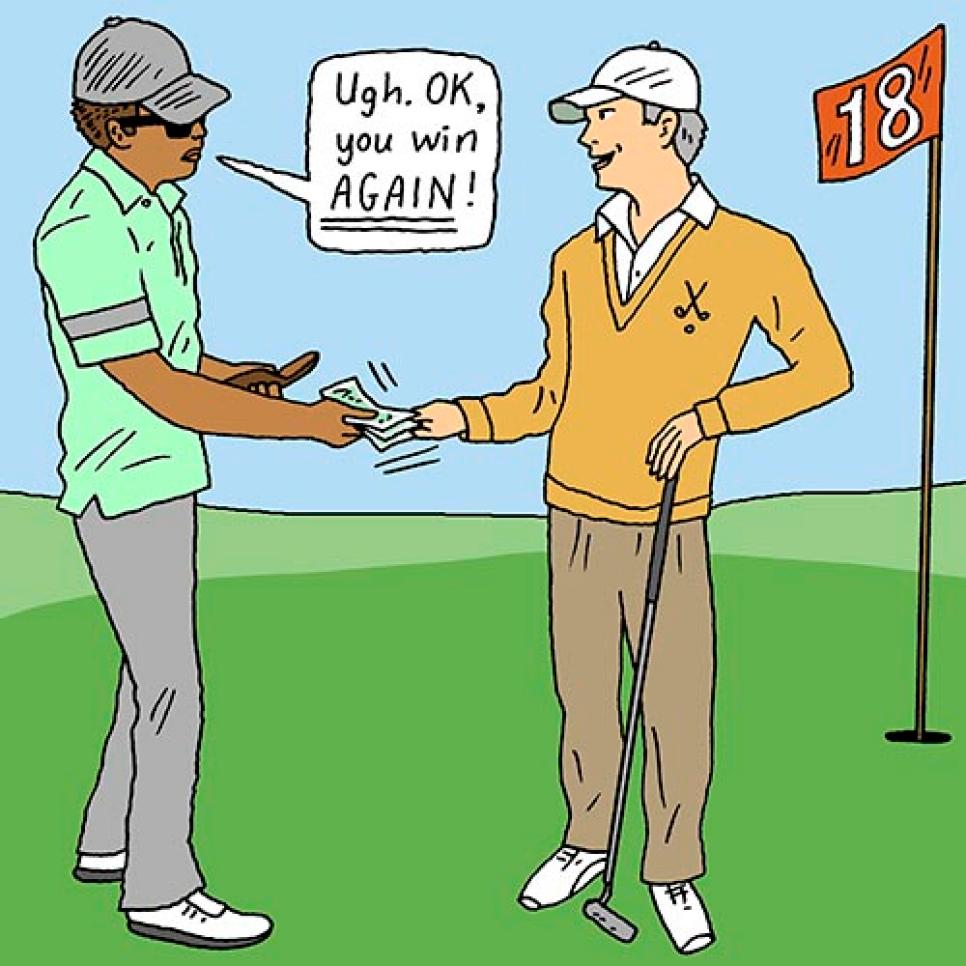Competition: Giving putts, mulligans, and bending the rules
Competition on the golf course is fun and beneficial to your golf game. Playing for something can spur on-course progress and make those beers at the end of the round taste even better -- especially if you’re not the one buying. But how do you ensure that you and your opponents have a good time and don’t wind up swinging mid-irons at each other? Here are some simple guidelines to follow.
I’m in a match and I completely blow it. Am I allowed to be frustrated?
First of all, you need to expect that this will happen. Even the best players in the world have off days and choke under pressure, so you better believe the same is going to happen to you. When it does, remember you should always smile and shake your opponent’s hand at the end of the match. During the match, it’s OK to be upset and show some emotion (Think: putting your club back in your bag with a little extra force), but don’t overdo it (Think: Snapping your club on a tree). No one wants to play with someone who acts like a raving lunatic or who is constantly whining and complaining. If you do this, apologize. But it’s better to try laughing off a mistake instead and use it as a learning experience. You’ll feel better and play better. Plus, breaking clubs is an expensive habit.
OK, but how do I act when an opponent blows it?
For starters, don’t even think about celebrating. Golf is frustrating enough. The last thing a player -- especially an amateur hacker -- needs is to see an opponent gloating over a miscue. In fact, try to avoid making any type of reaction and focus on your next shot or the next hole. Give your opponent some space when he or she is upset, and wait for them to indicate they’ve moved on before resuming your conversation. You don’t want to be a part of the next golf crime story to hit the news.
What if one of us hits a really, REALLY bad tee shot? Are mulligans still a thing?
Not if you’re playing an actual match. However, certain places -- Kiawah’s Ocean Course, for example -- encourage a “breakfast ball” off the first tee. And if you’re just playing among friends, you can always agree to allow each other a mulligan on your opening tee shots. Or maybe you want to allow one per round, or one per nine holes. Just make sure whatever you work out is clear ahead of time.
What about giving putts?
This is a little more complicated, but here’s a general rule of thumb: Don’t make your opponent putt anything that would offend you if the roles were reversed. Nothing can make a round get awkward fast quite like a golfer missing a tap-in, so err on the side of being generous. Giving putts can also vary on the status of the match (if you’re down big, you can be a little stingier), the conditioning of the course (if the greens were just punched, be more giving) and your opponent (if he/she’s making you putt everything out, then show NO MERCY). Some people give putts of a certain length (often using their putter grips, aka “it’s in the leather,” as a guide), but we should be above squatting down to measure.
It seems like playing a match creates a lot more tension and a lot more to keep track of. What if I don’t want to play one, but my playing partner does?
Then don’t play one. Say you’re not focused on your score. Say you have rage issues and that competition isn’t good for you. Say you weren’t raised in an era of gym-class dodgeball and that you don’t believe in winners and losers. OR, you could just suck it up and play a match. It doesn’t mean you have to play for anything. Simply measuring yourself against another golfer is a great way to improve your game.

What happens if my playing partner doesn’t want to play a match?
Give your partner that whole bit about getting better. Promise your partner it will be fun and that a loss won’t bring any public shame to his/her family. If none of that works, move on. There’s always the course -- and yourself -- to compete against. And there’s no rule that says you can’t try to beat his or her score on every hole anyway.
Speaking of my playing partner’s score, what if he seems to be, um, enhancing it?
First off, just know that labeling another golfer a cheater is the most serious allegation you can make on the course -- so don’t go throwing the C-word around lightly. If you do think something shady is going on, try to bring it up in the least abrasive way possible. “So that’s a 5? Even with the penalty? Nicely done.” Or “You found your ball in the woods AGAIN? Good, clean living, am I right?!” OK, don’t overdo it, but don’t let it go without saying anything, either. If you think the cheating is still going on and this is an official tournament, call in a rules official. If it’s just a “friendly” round, address it before it gets out of hand, and perhaps, suggest that you just play for fun.